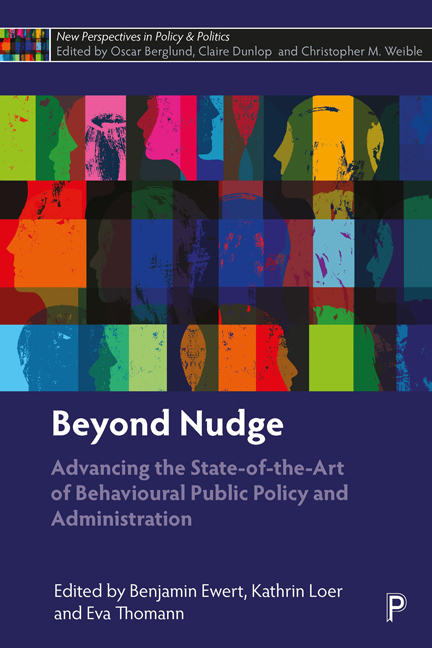Book contents
- Frontmatter
- Contents
- List of figures and tables
- Notes on contributors
- Acknowledgements
- 1 Beyond nudge: advancing the state-of-the-art of Behavioural Public Policy and Administration
- 2 Advancing behavioural public policies: in pursuit of a more comprehensive concept
- 3 A behavioural model of heuristics and biases in frontline policy implementation
- 4 Who are behavioural public policy experts and how are they organised globally?
- 5 Why nudge sometimes fails: fatalism and the problem of behaviour change
- 6 Behavioural insights teams in practice: nudge missions and methods on trial
- 7 Can street-level bureaucrats be nudged to increase effectiveness in welfare policy?
- 8 What motivates street-level bureaucrats to implement the reforms of elected politicians?
- 9 How can better monitoring, reporting and evaluation standards advance behavioural public policy?
- 10 Conclusion
- Index
2 - Advancing behavioural public policies: in pursuit of a more comprehensive concept
Published online by Cambridge University Press: 28 March 2024
- Frontmatter
- Contents
- List of figures and tables
- Notes on contributors
- Acknowledgements
- 1 Beyond nudge: advancing the state-of-the-art of Behavioural Public Policy and Administration
- 2 Advancing behavioural public policies: in pursuit of a more comprehensive concept
- 3 A behavioural model of heuristics and biases in frontline policy implementation
- 4 Who are behavioural public policy experts and how are they organised globally?
- 5 Why nudge sometimes fails: fatalism and the problem of behaviour change
- 6 Behavioural insights teams in practice: nudge missions and methods on trial
- 7 Can street-level bureaucrats be nudged to increase effectiveness in welfare policy?
- 8 What motivates street-level bureaucrats to implement the reforms of elected politicians?
- 9 How can better monitoring, reporting and evaluation standards advance behavioural public policy?
- 10 Conclusion
- Index
Summary
Introduction
Behavioural public policy (BPP) has been suggested as a new policy paradigm to utilise behavioural insights, that is, evidence-based expertise on human behaviour, for policy making. So far, behavioural policies are predominantly based on insights from behavioural economics and psychology in order to ‘nudge’ people to act in line with predefined aims and to overcome the dilemma of behaviour that contradicts economic rationality and is in conflict with desired policy ends. However, behavioural insights are ‘embedded in several historical trajectories and contexts rather than converged into one pattern’ (Strassheim and Beck, 2019: 5). Thus, the term refers by no means exclusively to people’s bounded rationality (Simon, 1991), even if it is this context which BPP is mostly associated with. Instead, we advocate to conceptualise BPP as a multi-disciplinary and multi-methodological policy concept that utilises insights from the whole range of behavioural research for plural purposes throughout the policy process.
Against this backdrop, this chapter makes a contribution to the theory of BPP by investigating the abundance of behavioural and social sciences, as well as pluralistic methods and research findings that effectively lay the ground for our ‘advanced BPP’ – a concept that is much broader in terms of applied disciplines and methods than its predecessor. In line with the introduction to this themed issue (Ewert et al, 2020), advanced BPP moves considerably beyond nudge politics and those behavioural interventions that exclusively focus on the micro level of policy making. Hence, we attempt to identify conceptual voids with regard to different fields of social sciences as a grounding for future behavioural policies. Based on a wider disciplinary and methodological foundation, we seek to further the conceptual shaping of behavioural policy making which is still very likely to be equated with a top-down roll-out of behaviour change policies (Jones et al, 2013), notwithstanding some efforts to extend its meaning and application forms (see for example, Gopalan and Pirog, 2017). Furthermore, current BPP mostly tends to perceive people’s behaviour as being isolated from social, cultural and environmental conditions that surround ‘the “doers” of behaviour’ (Spotswood and Marsh, 2016: 286). In contrast to any kind of activity that, speaking in Granovetter’s (1985: 483) terms, is embedded in and constituted by people’s various social relations, behavioural policy makers seem to be inclined to an ‘undersocialised conception of human action’.
- Type
- Chapter
- Information
- Beyond NudgeAdvancing the State-of-the-Art of Behavioural Public Policy and Administration, pp. 16 - 43Publisher: Bristol University PressPrint publication year: 2023

